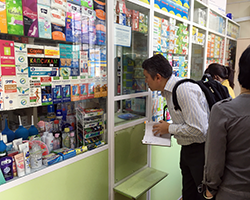Robust regulatory framework in Kyrgyzstan will improve financial access to medicines

WHO
In August 2017, 3 new strategic laws on regulating medicines and health technologies entered into force in Kyrgyzstan. A year on, the introduction of new legislation and the resulting robust regulatory framework are contributing to making medicines and medical devices more affordable in the country.
The laws were a turning point for the strengthening of the Kyrgyz health-care sector. They harmonize the requirements of accession to the Eurasian Economic Union and its common market, which will fully come into force on 1 January 2021.
One of the key achievements of the new laws is that they allow the Government to regulate the prices of medicines and medical devices to make them more affordable. They also introduce differentiated mechanisms for the registration of medicines and medical devices.
In 2018, national authorities with WHO’s support made bold steps towards the development of the bylaws in different areas of pharmaceuticals and medical devices regulation in order to fully enforce these new legal provisions. In this context, WHO continues to provide specific technical assistance to Kyrgyzstan to achieve internationally recognized quality standards on:
- the regulation of quality and circulation of medicines and medical devices;
- post-marketing control and monitoring of medicine and medical devices; and
- the transparency, predictability and accountability of the pharmaceutical sector.
Enforcement of the laws will have a positive impact on the availability of safe, effective and affordable medicines and medical devices in Kyrgyzstan, which is a key pillar of universal health coverage and the health-related Sustainable Development Goals.
Strengthening National Regulatory Agency’s capacity
Effective regulatory systems are an essential component of health systems and contribute to better public health outcomes. WHO plays a pivotal role in supporting countries in strengthening their regulatory systems to ensure that all medicines brought into the market are safe and effective.
Kyrgyzstan’s National Regulatory Agency is currently assessing its function using a harmonized approach – the WHO Global Benchmarking Tool. WHO technical assistance will enable the identification of strengths and areas for improvement, as well as the elaboration of an institutional development plan (IDP). The IDP will identify the technical and financial support needed for its implementation with continued monitoring of progress and impact.
Context of ongoing reforms
This technical support was provided as part of the development assistance and financial support from WHO set out in the biennial collaborative agreement for 2018–2019 between the Ministry of Health of Kyrgyzstan and WHO. In this context, Kyrgyzstan is continuing to strengthen health financing, reinforce policy dialogue, improve access to quality care and medicine, and promote universal health coverage in the country.



